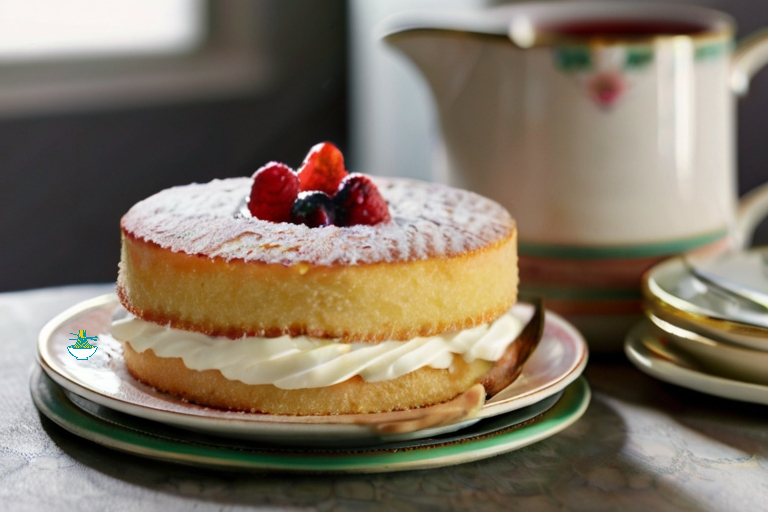Indulge in the timeless elegance of England's favorite dessert with our Victoria Sponge Cake. Layers of light, fluffy sponge cake embrace a luxurious filling of fresh cream and luscious raspberry jam, creating a harmony of flavors that epitomizes traditional British baking. Topped with a dusting of powdered sugar, this delectable treat is perfect for afternoon tea, celebrations, or simply satisfying your sweet cravings with a taste of British nostalgia. Enjoy a slice of culinary history with every bite of our exquisite Victoria Sponge Cake.
Here's a traditional recipe for making an English Victoria Sponge Cake:
Ingredients:
- 200g (1 cup) unsalted butter, softened, plus extra for greasing
- 200g (1 cup) caster sugar
- 4 large eggs, at room temperature
- 200g (1 2/3 cups) self-raising flour, sifted
- 1 teaspoon baking powder
- 2 tablespoons milk
- 150ml (2/3 cup) double cream
- 4 tablespoons raspberry jam
- Icing sugar, for dusting

Instructions:
1- Preheat your oven to 180°C (350°F). Grease two 20cm (8-inch) round cake tins and line the bases with parchment paper.
2- In a large mixing bowl, cream together the softened butter and caster sugar until pale and fluffy.
3- Beat in the eggs, one at a time, ensuring each egg is fully incorporated before adding the next.
4- Sift the self-raising flour and baking powder into the bowl with the creamed mixture. Gently fold the flour into the mixture until just combined. Be careful not to overmix.
5- Stir in the milk to loosen the batter slightly, ensuring it has a smooth consistency.
6- Divide the batter evenly between the prepared cake tins, spreading it out evenly with a spatula.
7- Bake in the preheated oven for 20-25 minutes, or until the cakes are golden brown and spring back when lightly pressed in the center.
8- Remove the cakes from the oven and allow them to cool in the tins for 5 minutes before transferring them to a wire rack to cool completely.
9- Once the cakes are completely cooled, whip the double cream until it forms soft peaks.
10- Place one of the sponge cakes on a serving plate or cake stand. Spread the raspberry jam evenly over the top of the cake.
11- Spoon the whipped cream over the jam, spreading it out evenly.
12- Carefully place the second sponge cake on top of the cream layer, pressing down gently to sandwich the cake together.
13- Dust the top of the cake with icing sugar before serving.
14- Slice and enjoy your delicious homemade Victoria Sponge Cake with a cup of tea or coffee!
This classic recipe captures the essence of traditional English baking, delivering a light, fluffy sponge cake filled with creamy goodness and fruity sweetness.
Nutritional Values:
Here are the approximate nutritional values for the main ingredients used in the Victoria Sponge Cake recipe:
Unsalted Butter (200g):
- Calories: 1432 kcal
- Total Fat: 160g
- Saturated Fat: 100g
- Cholesterol: 400mg
- Sodium: 24mg
- Carbohydrates: 0g
- Protein: 2g
benefits:
- Provides rich flavor and moist texture to baked goods.
- Contains fat-soluble vitamins like A, D, E, and K.
- Adds richness and tenderness to the cake.
Caster Sugar (200g):
- Calories: 774 kcal
- Total Fat: 0g
- Sodium: 0mg
- Carbohydrates: 200g
- Sugars: 200g
- Protein: 0g
benefits:
- Sweetens the cake and helps in caramelization during baking.
- Provides quick dissolving, making it ideal for baking.
Large Eggs (4 eggs):
- Calories: 280 kcal
- Total Fat: 20g
- Saturated Fat: 6g
- Cholesterol: 840mg
- Sodium: 280mg
- Carbohydrates: 0g
- Protein: 24g
benefits:
- Serve as a binding agent, helping to hold the cake together.
- Contribute moisture and structure to the cake.
- Provide protein and essential nutrients.
Self-raising Flour (200g):
- Calories: 708 kcal
- Total Fat: 1.6g
- Sodium: 2560mg
- Carbohydrates: 148g
- Fiber: 5.6g
- Sugars: 0g
- Protein: 21.6g
benefits:
- Contains leavening agents (baking powder) which help the cake rise.
- Provides structure and volume to the cake.
- Simplifies baking by eliminating the need for additional leavening agents.
Baking Powder (1 teaspoon):
- Calories: 2 kcal
- Total Fat: 0g
- Sodium: 488mg
- Carbohydrates: 0.9g
- Protein: 0g
benefits:
- Acts as a leavening agent, helping the cake to rise by releasing carbon dioxide gas when heated.
- Ensures a light and fluffy texture in the cake.
Milk (2 tablespoons):
- Calories: 10 kcal
- Total Fat: 0.1g
- Cholesterol: 1mg
- Sodium: 8mg
- Carbohydrates: 1.4g
- Sugars: 1.4g
- Protein: 0.7g
benefits:
- Adds moisture and richness to the cake.
- Helps to achieve a tender crumb texture.
- Provides essential nutrients like calcium and vitamin D.
Double Cream (150ml):
- Calories: 492 kcal
- Total Fat: 52.5g
- Saturated Fat: 32.7g
- Cholesterol: 194mg
- Sodium: 45mg
- Carbohydrates: 4.1g
- Sugars: 4.1g
- Protein: 3.5g
benefits:
- Contributes richness and creaminess to the filling.
- Adds a luxurious texture and flavor to the cake.
- Contains fat-soluble vitamins and provides energy.
Raspberry Jam (4 tablespoons):
- Calories: 212 kcal
- Total Fat: 0.1g
- Sodium: 4mg
- Carbohydrates: 54g
- Sugars: 40g
- Protein: 0.8g
benefits:
- Adds a sweet and tangy flavor to the cake.
- Provides moisture and enhances the fruity taste.
- Adds a colorful and visually appealing layer to the cake.
Please note that these values are approximate and may vary based on factors such as brand, specific ingredients used, and method of preparation.


Comments